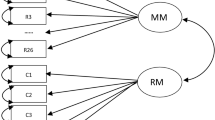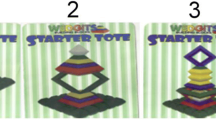Abstract
Metacognitive training techniques have been used successfully to improve children's problem-solving skills. The concept of metacognition needs further refinement, however, if it is to continue to be useful as an explanatory construct. Specifically, we argue that more attention needs to be paid to how metacognitive abilities are acquired, how this knowledge could be used to help improve the performance of children with learning difficulties, and how metacognition may be related to other self-evaluation processes.
Similar content being viewed by others
References
Baker, L., & Brown, A. L. (1984). Metacognitive skills in reading. In D. P. Pearson (Ed.),Handbook of reading research (pp. 353–394). New York: Longman.
Belmont, J. M., & Butterfield, E. C. (1977). The instructional approach to developmental cognitive research. In R. V. Kail, Jr., & J. W. Hagen (Eds.),Perspectives on the development of memory and cognition (pp. 437–481). Hillsdale, New Jersey: Erlbaum.
Bereiter, C., & Scardamalia, M. (1982). From conversation to composition: The role of instruction in a developmental process. In R. Glaser (Ed.),Advances in instructional psychology (Vol. 2, pp. 1–64). Hillsdale, New Jersey: Erlbaum.
Bloom, B. W. (1984). The 2 sigma problem: The search for methods of group instruction as effective as one-to-one tutoring.Educational Researcher, 13, 4–16.
Borkowski, J. G., & Cavanaugh, J. C. (1979). Maintenance and generalization of skills and strategies by the retarded. In N. R. Ellis (Ed.),Handbook of mental deficiency: Psychological theory and research (pp. 569–617). Hillsdale, New Jersey: Erlbaum.
Brown, A. L. (1975). The development of memory: Knowing about knowing, and knowing how to know. In H. W. Reese (Ed.),Advances in child development and behavior (Vol. 10, pp. 103–152). New York: Academic Press.
Brown, A. L. (1978). Knowing when, where, and how to remember: A problem of metacognition. In R. Glaser (Ed.),Advances in instructional psychology (Vol. 1, pp. 77–165). Hillsdale, New Jersey: Erlbaum.
Brown, A. L. (1982). Learning and development: The problem of compatibility, access and induction.Human Development, 25, 89–115.
Brown, A. L., Armbruster, B. B., & Baker, L. (in press). The role of metacognition in reading and studying. In J. Orasanu (Ed.),Reading comprehension: From research to practice. Hillsdale, New Jersey: Erlbaum.
Brown, A. L., Bransford, J. D., Ferrara, R. A., & Campione, J. C. (1983). Learning, remembering, and understanding. In J. H. Flavell & E. M. Markman (Eds.);Handbook of child psychology: Vol. 1. Cognitive development (pp. 77–166). New York: Wiley.
Brown, A. L., & Campione, J. C. (1984). Three faces of transfer: Implications for early competence, individual differences, and instruction. In M. Lamb, A. L. Brown, & B. Rogoff (Eds.),Advances in developmental psychology (Vol. 3, pp. 143–192). Hillsdale, New Jersey: Erlbaum.
Brown, A. L., Campione, J. C., & Barclay, C. R. (1979). Training self-checking routines for estimating test readiness: Generalization from list-learning to prose recall.Child Development, 50, 501–512.
Brown, A. L., Campione, J. C., & Day, J. D. (1981). Learning to learn: On training students to learn from texts.Educational Researcher, 10, 14–21.
Brown, A. L., & DeLoache, J. S. (1978). Skills, plans and self-regulation. In R. S. Siegler (Ed.),Children's thinking: What develops (pp. 3–35). Hillsdale, New Jersey: Erlbaum.
Brown, A. L., & French, L. A. (1979). The zone of potential development: Implications for intelligence testing in the year 2000.Intelligence, 3, 255–277.
Brown, A. L., & Palinscar, A. S. (1982). Inducing strategic learning from texts by means of informed, self-control training.Topics in Learning and Learning Disabilities, 2, 1–17.
Brown, A. L., & Palinscar, A. S. (in press). Reciprocal teaching of comprehension strategies: A natural history of one program for enhancing learning. In J. Borkowski & J. D. Day (Eds.),Intelligence and cognition in special children: Comparative studies of giftedness, mental retardation, and learning disabilities. New York: Ablex.or]Brown, A. L., & Reeve, R. A. (in press). Bandwidths of competence: The role of supportive contexts in learning and development. In L. S. Liben & D. H. Feldman (Eds.),Development and learning: Conflict and congruence? Hillsdale, New Jersey: Erlbaum.
Bruner, J. S. (1981). The organization of action and the nature of adult-infant transaction. In G. d'Ydenwalle & W. Lens (Eds.),Cognition in human motivation and learning (pp. 1–14). Hillsdale, New Jersey: Erlbaum.
Bruner, J. S. (1984). Vygotsky's zone of proximal development: The hidden agenda. In B. Rogoff, & J. V. Wertsch (Eds.),Children's learning in the “zone of proximal development” (pp. 93–98). San Francisco: Jossey-Bass.
Campione, J. C., & Armbruster, B. B. (1985). Acquiring information from texts: An analysis of four approaches. In S. Chipman, J. Segal, & R. Glaser (Eds.),Thinking and learning skills: Relating instruction to basic research (Vol. 1, pp. 317–359). Hillsdale, New Jersey: Erlbaum.
Campione, J. C., & Brown, A. L. (1978). Toward a theory of intelligence: Contributions from research with retarded children.Intelligence, 2, 279–304.
Campione, J. C., & Brown, A. L. (1984). Learning ability and transfer propensity as sources of individual differences in intelligence. In P. H. Brooks, R. Sperber, & C. McCauley (Eds.),Learning and cognition in the mentally retarded (pp. 265–294). Baltimore: University Park Press.
Campione, J. C., Brown, A. L., & Ferrara, R. A. (1982). Mental retardation and intelligence. In R. J. Sternberg (Ed.),Handbook of human intelligence (pp. 392–492). New York: Cambridge University Press.
Cavanaugh, J. C., & Perlmutter, M. (1982). Metamemory: A critical evaluation.Child Development, 53, 11–28.
Chi, M. T. H. (1981). Knowledge development in memory performance. In M. P. Friedman, J. P. Das, & N. O'Connor (Eds.),Intelligence and learning (pp. 221–229). New York: Plenum.
Cole, M., & Traupman, K. (1981). Comparative cognitive research: Learning from a disabled child. In A. Collins (Ed.),Minnesota symposium on child development (Vol. 13, pp. 125–154). Hillsdale, New Jersey: Erlbaum.
Day, J. D. (1980).Training summarization skills: A comparison of teaching methods. Unpublished doctoral dissertation, University of Illinois.
Dweck, C. S., & Bempechat, J. (1983). Children's theories of intelligence: Consequences for learning. In S. G. Paris, G. M. Olson, & H. W. Stevenson (Eds.),Learning and motivation in the classroom (pp. 239–256). Hillsdale, New Jersey: Erlbaum.
Dweck, C. S., & Elliott, E. S. (1983). Achievement motivation. In E. M. Hetherington (Ed.),Handbook of child psychology: Vol. 4. Socialization, personality and social development (pp. 643–692). New York: Wiley.
Flavell, J. H. (1970). Developmental studies of mediated memory. In H. W. Reese & L. P. Lipsitt (Ed.),Advances in child development and behavior (Vol. 5, pp. 181–211). New York: Academic Press.
Flavell, J. H. (1971). First discussant's comments: What is memory development the development of?Human Development, 14, 272–278.
Flavell, J. H. (1979). Metacognition and cognitive monitoring: A new area of cognitive-developmental inquiry.American Psychologist, 34, 906–911.
Flavell, J. H. (1981). Cognitive monitoring. In W. P. Dickson (Ed.),Children's oral communication skills (pp. 35–60). New York: Academic Press.
Flavell, J. H. (1982). On cognitive development.Child Development, 53, 1–10.
Forrest-Pressley, D., & Waller, T. G. (1984).Cognition, metacognition and reading. New York: Springer-Verlag.
Greenfield, P. M. (1984). A theory of the teacher in the learning activities of everyday life. In B. Rogoff & J. Lave (Eds.),Everyday cognition: Its development in social context (pp. 117–138). Cambridge: Harvard University Press.
Harter, S. (1981). A model of mastery motivation in children: Individual differences and developmental changes. In A. Collins (Ed.),Aspects of the development of competence: The Minnesota symposium of child development (Vol. 14, pp. 215–255). Hillsdale, New Jersey: Erlbaum.
Hatano, G. (1982). Cognitive consequences of practice on cultural specific skills.Quarterly Newsletter of the Laboratory of Comparative Human Cognition, 4, 15–18.
James, W. (1890).Principles of psychology (Vol. 1). New York: Holt.
Laboratory of Comparative Human Cognition. (1983). Culture and cognitive development. In W. Kessen (Ed.),Handbook of child psychology: Vol. 1. History, theory, and methods (pp. 295–356). New York: Wiley.
Luria, A. R. (1976).Cognitive development: Its cultural and social foundations. Cambridge: Harvard University Press.
Meichenbaum, D. (1984). Teaching thinking: A cognitive-behavioral perspective. In S. Chipman & J. Segal (Eds.),Thinking and learning skills: Current research and open questions. Hillsdale, New Jersey: Erlbaum.
Palinscar, A. S., & Brown, A. L. (1981).The comparative effects of corrective feedback training on the comprehensive skills of junior high students. Unpublished manuscript, University of Illinois.
Palinscar, A. S., & Brown, A. L. (1984). Reciprocal teaching of comprehension-fostering and comprehension monitoring activities.Cognition and Instruction, 1, 117–175.
Paris, S. G., & Myers, M. (1981). Comprehension monitoring memory and study strategies of good and poor readers.Journal of Reading Behavior, 13, 5–22.
Paris, S. G., Newman, R. S., & McVey, K. A. (1982). From tricks to strategies: Learning the functional significance of mnemonic actions.Journal of Experimental Child Psychology, 34, 450–509.
Piaget, J. (1926).The language and thought of the child. London: Routledge and Kegan Paul.
Rogoff, B., & Lave, J. (1984).Everyday cognition: Its development in social context. Cambridge: Harvard University Press.
Rogoff, B., Malkin, C., & Gilbride, K. (1984). Interaction with babies as guidance in development. In B. Rogoff & J. V. Wertsch (Eds.),Children's learning in the “zone of proximal development” (pp. 31–44). San Francisco: Jossey-Bass.
Rogoff, B., & Wertsch, J. V. (1984).Children's learning in the “zone of proximal development.” San Francisco: Jossey-Bass.
Ruble, D. N., Boggiano, A. K., Feldman, N. S., & Loebl, J. H. (1980). Developmental analysis of the role of social comparison in self-evaluation.Developmental Psychology, 16, 105–115.
Scardamalia, M., & Bereiter, C. (1982). Assimilative processes in composition planning.Educational Psychologist, 17, 165–171.
Scardamalia, M., Bereiter, C., & Steinbach, R. (1984). Teachability of reflective processes in written composition.Cognitive Science, 8, 173–190.
Siegler, R. S. (1983). Information processing approaches to development. In W. Kessen (Ed.),Handbook of child psychology: Vol. 1. History, theory, and methods (pp. 129–212). New York: Wiley.
Vygotsky, L. S. (1978).Mind and society: The development of higher psychological processes. M. Cole, V. John-Steiner, S. Scribner, & E. Souberman (Eds. & trans.). Cambridge: Harvard University Press.
Wertsch, J. V. (1979). From social interaction to higher psychological process: A clarification and application of Vygotsky's theory.Human Development, 22, 1–22.
Wertsch, J. V. (1984). The zone of proximal development: Some conceptual issues. In B. Rogoff & J. V. Wertsch (Eds.),Children's learning in the “zone of proximal development” (pp. 7–18). San Francisco: Jossey-Bass.
Author information
Authors and Affiliations
Additional information
This paper was completed with support from the National Institute of Child Health and Human Development (Grant HD05951), and from the Department of Education (Grant 00840068). We would like to express our appreciation and thanks to Joseph Campione and to Annemarie Palinscar, who patiently listened to, and frequently commented upon, the ideas presented in this paper.
Rights and permissions
About this article
Cite this article
Reeve, R.A., Brown, A.L. Metacognition reconsidered: Implications for intervention research. J Abnorm Child Psychol 13, 343–356 (1985). https://doi.org/10.1007/BF00912721
Issue Date:
DOI: https://doi.org/10.1007/BF00912721




